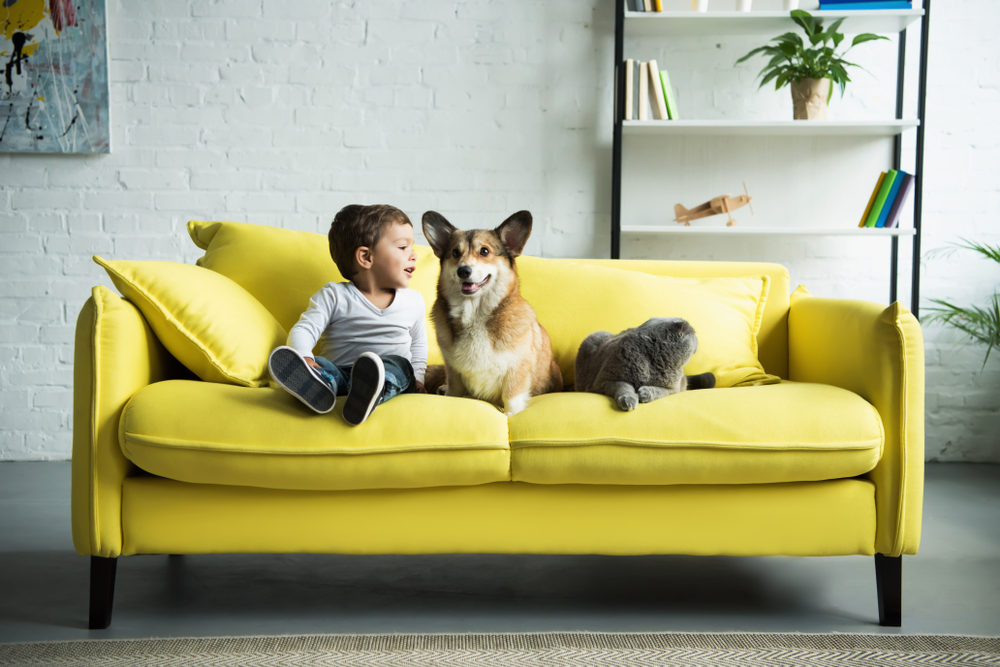Choosing the right type of new family pet is an important decision. Owning a pet is a lifelong responsibility that should not be undertaken lightly. So, although you may be enamored with giant Irish wolfhounds, your studio apartment space and traveling lifestyle say otherwise.
When choosing the right pet to add to your family, consider the following key factors.
#1: Space: How much do you have for a pet?
A pet’s size does not always match with their space requirements, but large pets generally require more room. For example, a rambunctious Labrador puppy who will reach 80 pounds as an adult will certainly need more indoor and outdoor space to play and exercise than a 4-pound toy Yorkie, although some small pets (e.g., fish, birds) need large habitats to live comfortably. Consider your available space for a pet to play, exercise, and sleep.
#2: Lifestyle: Will your pet always be home alone?
Your lifestyle factors heavily into pet choice. People who are constantly on the go, whether for work, entertainment, or travel, should not have a social pet who thrives on company and interaction. A pet who requires minimal handling and less frequent care is a better choice.
Social pets can still thrive in busy households if they can tag along or you can provide plenty of opportunities to fulfill their mental, physical, and social needs. So, an active dog would make an excellent hiking companion or a friendly pup may do well in doggy daycare during the workday.
If your lifestyle is slower-paced, almost any pet would be a good choice. You would have only to be available to interact with and care for them (e.g., feeding, exercising, cleaning) as needed.
#3: Budget: Remember—pets are not cheap
Considering your pet care budget is important, as some species or breeds can make a significant dent in your wallet over time. If your heart is set on bringing home a squishy-faced bulldog, you must consider the additional veterinary care bulldogs generally need compared with a breed with fewer genetic health problems. Also, larger pets often have larger expenses for food and bedding, medication and boarding fees, and everything in between.
First, consider a pet’s initial costs, which include purchasing the pet, a habitat, food, bowls, bedding, treats, and toys, plus veterinary wellness and preventive care. Then, tally the expected monthly costs for food, habitat maintenance, training classes, grooming, boarding, pet insurance, and regular veterinary preventive care (e.g., parasite prevention, prescriptions, annual visits). Ideally, you should also save funds for a pet emergency that will help cover unexpected expenses. Once you know your pet care budget, you can narrow down your choices.
#4: Current pets: Are they “me only?”
If you currently have any pets, you must know how they will react to a new family pet, as their attitudes can make or break a happy, peaceful household. Does your pet want to be the only one, or will they enjoy another animal’s companionship? Match personalities and play styles and, if possible, hold a meet-and-greet before bringing home a new pet. Separate your new pet and your current pet to allow them time to slowly acclimate to the new smells, sounds, and sights. Follow the specific guidelines for exotic pets on whether other members of the same species or sex can be introduced, or if they need permanent separate housing.
#5: Family: Consider their likes and dislikes of pets

You should also carefully consider your family’s restrictions before deciding on a new pet. Is your daughter allergic to cats, but desperate for a cuddly kitten? Or, do birds flying around your head freak you out, but your significant other would love a pair of parakeets? Take into account every family member’s thoughts, feelings, and allergy restrictions and ensure everyone agrees on the pet type that would best fit the whole family.
A few family-oriented considerations include:
- Age — Young children, despite their intentions, are not the best pet caretakers, so understand that the bulk of the caretaking will fall to you. Also, remember that small children are also easily knocked over, injured, or scared by large, exuberant pets, and elderly people are susceptible to pet-related injuries. Gentle, calm pets are generally best for these demographics.
- Health — Allergies to fur, feathers, or dander can rule out many pets, but you must also consider your family’s overall health status. Young children and senior citizens often have weaker immune systems and are more susceptible to zoonotic diseases and parasites, so do your research before bringing home a pet.
- Fears — Some people fear pets other than typical cats or dogs, so consider your family’s comfort level with all manner of pets, from reptiles to rodents, to ensure you pick an appropriate companion.
When you have made your choice, we will be eager to meet your new furry, scaled, or feathered friend and welcome them to the family. Get in touch with our Pioneer Animal Hospital team to schedule your new pet’s initial wellness visit.

